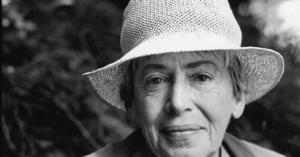|
Wednesday, 24 January 2018
quote [ Ms. Le Guin brought literary elegance and a feminist sensibility to science fiction and fantasy tales, drawing millions of readers around the world. ]
It's the times...we are losing the greats. RIP
|
Comments
|
midden said[1] @ 1:36am GMT on 24th Jan
[Score:4 Underrated]
Ouch. Her book, A Wizard of Earthsea was a powerful influence on me in middle school. I still re-read it every few years. One of the things I found so disappointing when I tried to read the Harry Potter books was how poorly Hogwarts measured up to Roke.
Three lessons I got from the Earthsea trilogy: the only way to defeat the darkness within each of us is by first accepting its existence, the power of solitude and it's corollary, companionship, the strength to be found in letting go. Pretty powerful stuff to so clearly convey to a ten year old. |
|
cb361 said[2] @ 8:34am GMT on 24th Jan
Likewise. Many years later I read Tehanu, the fourth book in the series, and instead of a nice fantasy world with wizards and dragons, it was a scream against the (mostly misogynistic) hate in the world.
Towards the end, our (Ice-bitch and Beta-Cuck) protagonists are captured and degraded, body and mind. They are as powerless and helpless as any regular person, against an Alpha Male wielding magic, and there are no white knights left in the story to ride to their aid. Reading it, I was furious. Up until that point, I hadn't realised how much I had come to care for the characters of Ged and Tenar over the years and readings. And I wasn't angry at the shitty heteronormative wizard in the story who was torturing and murdering them. I was angry at Ursula K. Le Guin. I was literally thinking "Just kill them and be done with it, but not this. Not this" In fact, just as they were indeed about to be pushed off a cliff, there was one last White Knight (Ha ha!) in the story, but I have always remembered that sudden anger I felt towards the author creating her story. |
|
midden said[1] @ 2:22pm GMT on 24th Jan
It's interesting to me that while I know I did read Tehanu in my early twenties, shortly after it was published, I couldn't tell you much about it. I've only ever read it that once, and have never felt compelled to go back to it like I do the original trilogy.
|
|
cb361 said @ 3:16pm GMT on 24th Jan
I agree, but I got on less well with the third book too. It seemed overly depressing to my youthful brain. Many years later Le Guin provided greater closure for her take on the afterlife.
|
|
midden said @ 5:16pm GMT on 24th Jan
Could you expand on that point? Which book/story are you referring to when you say she later provided greater closure? I think I've read a few of her other books, but none of them have stuck with me like the Earthsea trilogy, certainly not enough to recall off the top of my head. I've also read a couple of her short story collections, and in my teens I tried to read Left Hand of Darkness more than once, but never got very far.
|
|
cb361 said @ 7:45pm GMT on 24th Jan
In the original trilogy, the (human) afterlife is a miserable, spectral existence, where "those who died for love pass each other in the street." I don't remember the details much either, but in the final book, written much much later, some rationale for this is given - that humans had created this afterlife because of their fear of death and non-existence. I seem to remember that the dry-stone wall between the worlds of the living and the dead is knocked down too, or something. My sister gave me The Other Wind for Christmas, but I only read it once and quite a few years ago. I always meant to read Le Guin's non-Earthsea books, but never have done.
|
|
midden said @ 8:16pm GMT on 24th Jan
[Score:1 Informative]
Oh, ok. I don't interpret it as a miserable, spectral existence, though. It's not heaven, certainly, but neither is it hell. I take it instead as a depiction of non-existence. "Quiet were their faces, freed from anger and desire, and there was in their shadowed eyes no hope." They feel nothing, desire nothing, think nothing, remember nothing. The only real identity they have is that projected on them by the living. It's only a miserable existence if you cling to self and ego, as Cob does.
It's been a several years since I read it last, though. I think I'll have to put it on my list for this Spring. |
|
rylex said @ 2:24am GMT on 24th Jan
First Ursula, now Tinky Winky.
2018 is off to a good start |
|
cb361 said @ 1:12pm GMT on 24th Jan
It's the even-numbered ones you have to watch out for.
|
|
machpi said @ 10:13am GMT on 25th Jan
Hey, my modest goals have been to outlive David Attenborough and the Queen. ARE THESE PEOPLE IMMORTAL
|
Post a comment
[note: if you are replying to a specific comment,
then click the reply link on that comment instead]You must be logged in to comment on posts.

